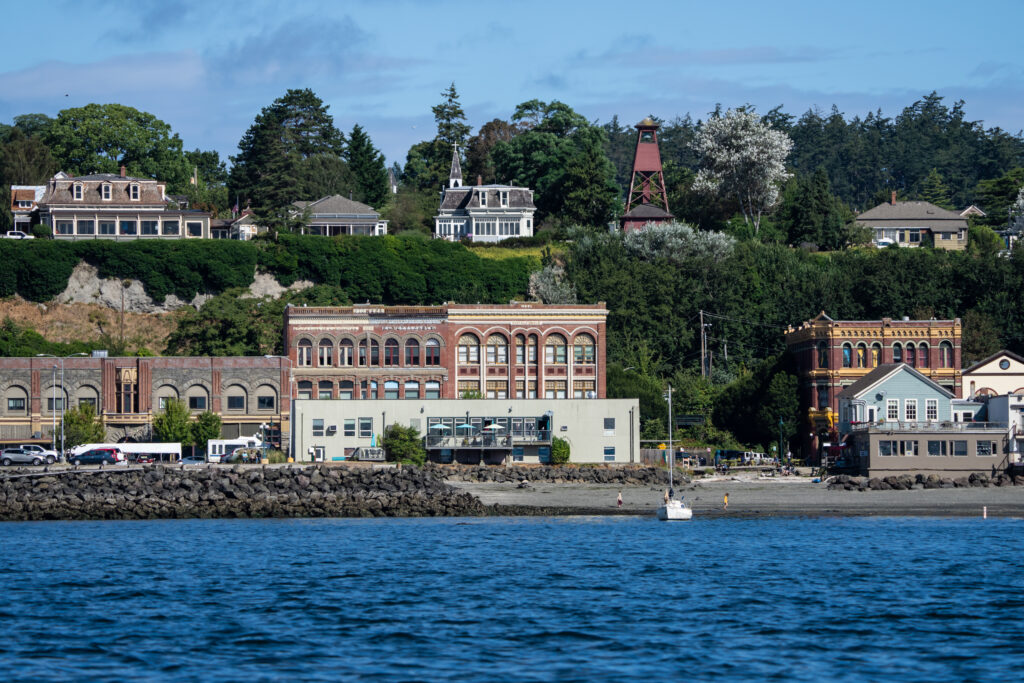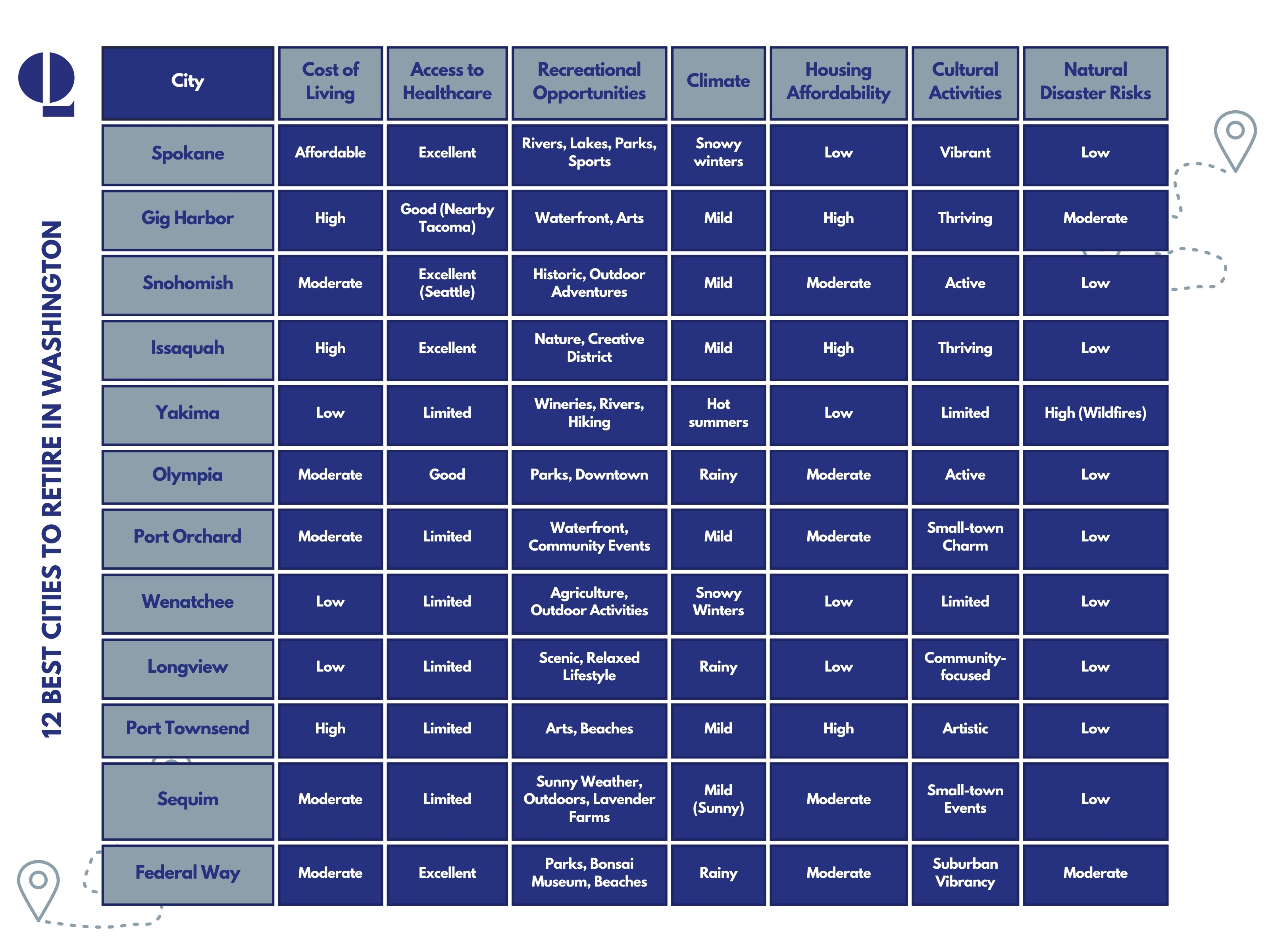Thinking about where to spend your golden years? The Evergreen State offers everything you could want for a fulfilling and worry-free retirement. As one of only nine states with no state income tax, choosing to retire in Washington state allows you to stretch your retirement savings further, making it an attractive choice for retirees.
With its diverse climates, stunning natural beauty, and vibrant cultural scenes, Washington provides retirees with an ideal balance of relaxation and adventure.
Why Retire in Washington State?
Washington is consistently ranked on national “Best Places to Retire” lists. Thanks to its top-notch healthcare, no state income tax, scenic landscapes, and abundance of recreational opportunities.
In addition to these benefits, Washington offers a variety of lifestyle options. From the mild coastal regions of Puget Sound to the sunny, dry areas of eastern Washington.
However, it’s important to note that real estate prices and local taxes can vary significantly across the state. This makes it essential to thoughtfully choose a location that fits your financial and personal priorities.
What to Expect in This Guide
This guide explores 12 of the best cities to retire in Washington State, highlighting both small, quaint towns and diverse, larger cities.
Each location has been evaluated based on key factors like cost of living, access to healthcare, recreation centers, recreational opportunities, and overall quality of life.
Whether you’re drawn to outdoor adventures, cultural attractions, or a strong sense of community, this list is designed to help you find the ideal Washington city for your retirement.
Key Factors for Choosing a Retirement City in Washington
Retiring in Washington state offers a wealth of opportunities. Selecting the right city for you involves considering various factors that impact your quality of life.
Here are some broad strokes to help guide your decision, focusing on the key elements that influence retirees across the state.
Cost of Living & Housing
Washington is known for its higher housing costs in many areas, particularly around the Puget Sound region. However, cities like Spokane, Yakima, and Wenatchee offer more affordable options compared to places like Issaquah or Gig Harbor.
Retirees should also consider property tax rates. These vary by city and county, and investigate exemptions available to income-qualifying older adults. Washington’s property tax rates are below the national average, and the state constitution limits standard property tax rates to a maximum of 1%.
State Tax Environment
One of Washington’s most attractive features is its lack of a state income tax, which benefits retirees drawing from pensions, IRAs, and Social Security. However, the state does have a sales tax that is higher than the national average and a Washington state estate tax with a relatively low exemption threshold.
Being aware of these tax burdens can help you plan effectively for your financial future.
Healthcare & Retirement Communities
Access to quality healthcare is crucial in retirement, and Washington offers a range of medical centers.
Larger cities like Spokane, Olympia, and Federal Way are home to major hospital networks, while smaller towns like Sequim and Port Townsend have clinics and specialized services tailored to seniors.
For those considering a retirement community or assisted living, many cities provide great options, along with resources to support aging in place. AARP ranked Washington #2 in the nation in its 2023 Long-Term Services and Supports Scorecard, highlighting the state’s strong quality and accessibility of long-term care—second only to Minnesota. Washington retirees can be confident that they’ll be well taken care of regardless of what their ideal retirement looks like.
Climate & Natural Disasters
Washington’s diverse geography means significant climate differences between its regions.
Western Washington cities like Issaquah, Gig Harbor, and Snohomish are characterized by a temperate, rainy climate, while eastern cities like Spokane and Yakima enjoy sunnier, drier weather in warm months and snowier winters.
Retirees should also consider natural disaster risks: eastern and central areas face occasional wildfire and air quality concerns, while western coastal cities may contend with earthquake and flooding risks due to fault lines and heavy rain. While Washington’s Mount St. Helens is one of the largest active volcanoes in the U.S., its last major eruption was in 1980. While no place is free from environmental risks, Washington faces fewer and less severe natural disasters than hurricane-prone Gulf states or the Midwest’s tornadoes.
Recreation & Lifestyle
Washington offers something for every lifestyle, from outdoor recreation to cultural amenities.
Cities like Port Townsend and Sequim are perfect for nature lovers, with access to the Olympic Peninsula and coastal activities. Wenatchee and Yakima cater to those who enjoy sunny weather and proximity to vineyards and hiking trails. The Evergreen State earns its nickname with emerald landscapes all over.
For cultural enthusiasts, cities like Olympia, Snohomish, and Spokane provide theaters, museums, and vibrant community events. Washington offers widespread broadband access and convenient air travel, even in many rural areas, making it easy to stay connected.
Now, let’s look at the best cities to retire in Washington state one by one to see their unique highlights and drawbacks.
The 12 Best Cities to Retire in Washington State
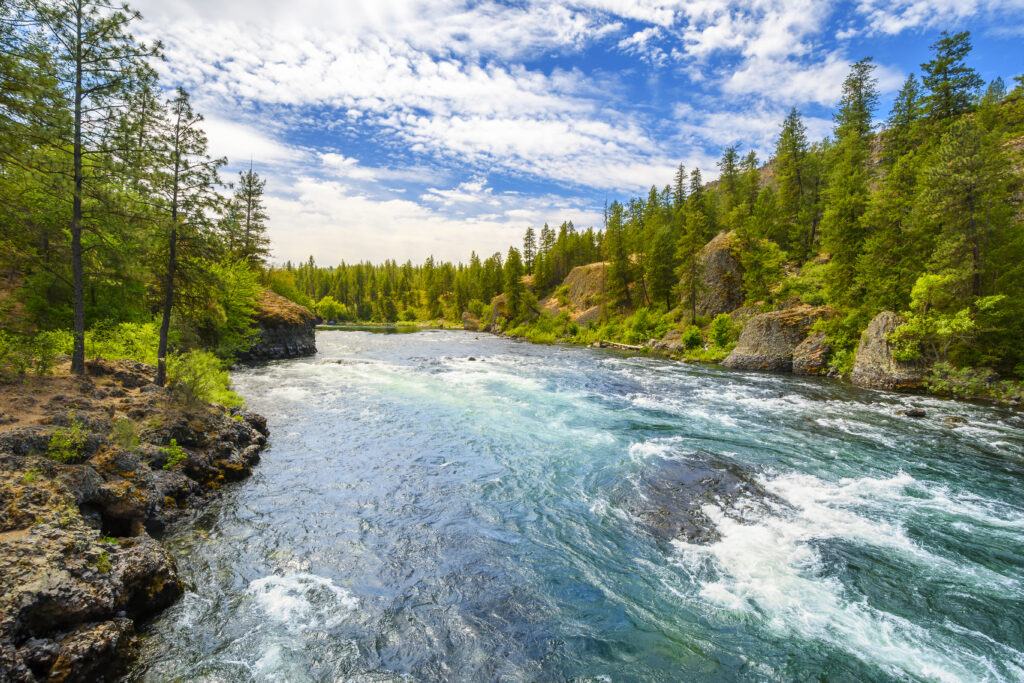
Spokane
Overview & Location
Located in eastern Washington near the Idaho border, Spokane combines city conveniences with a lower cost of living, a dynamic blend of outdoor recreation, cultural activities, and top-notch healthcare facilities making it an attractive choice for retirees.
Nestled in the Inland Northwest, Spokane is surrounded by natural beauty, including lakes, mountains, and parks, while providing the amenities of a thriving urban center as the state’s second largest city.
With its affordable cost of living and abundance of activities, Spokane is a top choice for retirees looking to enjoy a vibrant lifestyle while maximizing their retirement savings.
Highlights
- Healthcare: Renowned medical centers like Sacred Heart and Deaconess ensure top-notch care.
- Outdoor Recreation: The Spokane River, Riverfront Park, and 76 nearby lakes offer endless opportunities for outdoor activities. Nearby Coeur d’Alene, Idaho is a popular tourist spot for summer boating fun.
- Culture & Dining: From theaters to breweries, Spokane boasts a vibrant culinary and cultural scene.
- Sports & Recreation: Spokane is also a hub for sports enthusiasts, as the city shuts down busy streets to host iconic events like Bloomsday and Hoopfest. Skiers and golfers have plenty of choices, with five mountain resorts nearby and numerous affordable public golf courses.
Potential Drawbacks
- Higher crime and homelessness rates in some areas, such as downtown.
- Snowy winters can be challenging for some retirees.
Financial Planning Considerations
Spokane offers retirees significant financial advantages with its relatively low cost of living and affordable housing compared to other parts of Washington.
The city’s reasonable healthcare costs make it an appealing choice for budget-conscious individuals. Additionally, Spokane County offers a property tax exemption for qualifying seniors who own their home, saving some retirees thousands of dollars.
In addition to quality healthcare facilities like Sacred Heart and Deaconess hospitals, Spokane’s active population means it’s a hot spot for physical therapists and other specialists, enhancing its value for retirees.
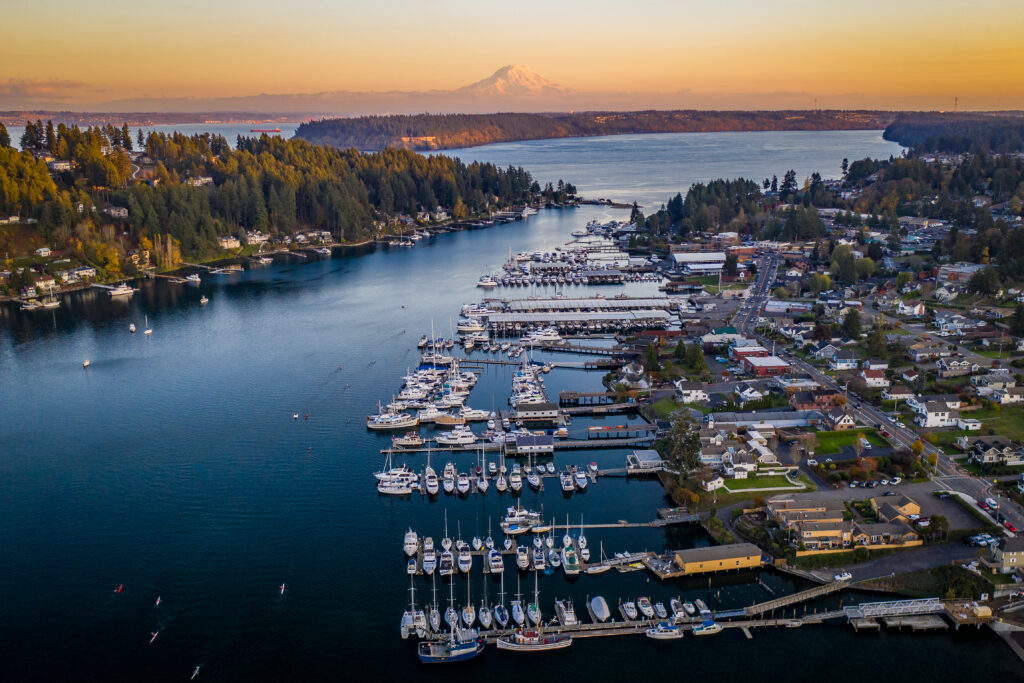
Gig Harbor
Overview & Location
Situated on Puget Sound, Gig Harbor offers retirees a unique blend of maritime charm and modern amenities.
Known for its scenic waterfront, boutique shops, and thriving arts community, this picturesque town provides a tranquil lifestyle with convenient access to nearby Tacoma and Seattle.
With its small-town feel and close proximity to high-quality medical centers, Gig Harbor is an excellent choice for those seeking a peaceful retirement without sacrificing access to big-city conveniences.
Highlights
- Waterfront Lifestyle: Boating, kayaking, and waterfront dining with stunning views. Sailors of all levels can charter a boat for a day or a romantic overnight adventure.
- Cultural Events: Farmers’ markets, festivals, and local arts thrive in this vibrant community. The annual Chowder Social is a can’t miss, raising funds for local education.
- Location: Gig Harbor is roughly 30 miles from the Seattle airport and retirees have access to high-quality medical centers in nearby urban areas.
Potential Drawbacks
- Above-average housing costs.
- Traffic can be high in the area, due to both tourists and commuters.
Financial Planning Considerations
While housing in Gig Harbor is more expensive than many cities on this list, it’s more affordable than many Seattle suburbs. Proximity to Tacoma and Seattle provides financial flexibility with access to diverse healthcare providers, medical centers, part-time work opportunities, affordable travel, and cultural activities without the need for big-city living expenses.
Home maintenance can be more expensive in coastal areas as homeowners have to manage moisture and salt damage.
The area’s high quality of life and thriving community make it a valuable choice for retirement planning.
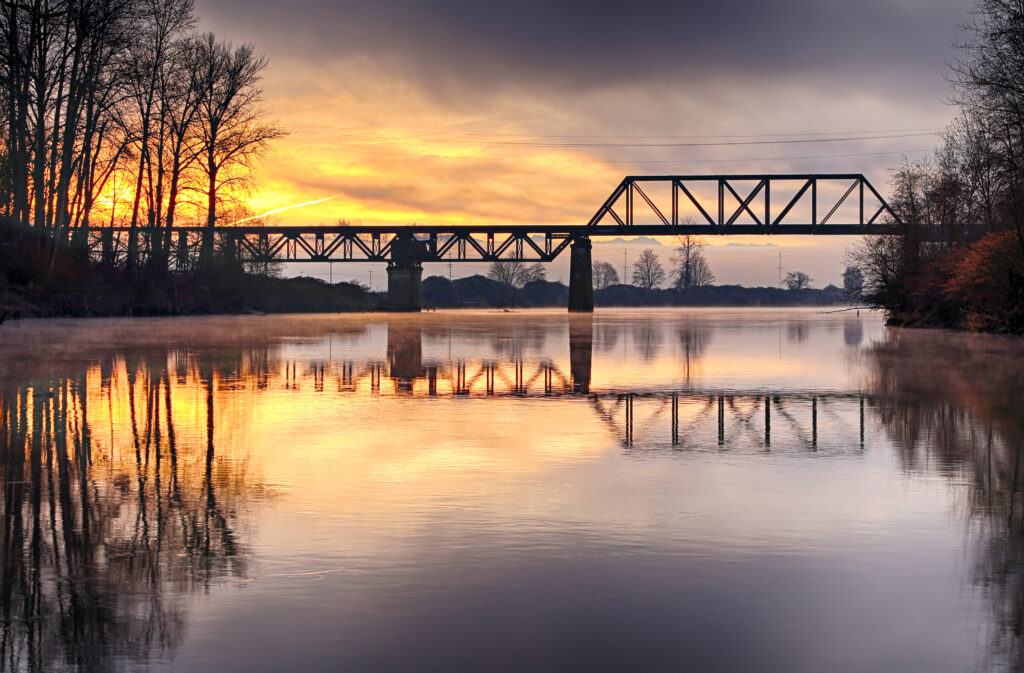
Snohomish
Overview & Location
Just 30 miles northeast of Seattle, Snohomish offers a world away from city life. While being close in distance maximizes convenience, it’s a charming small-town with a relaxed pace of life and historic feel, making it a refreshing escape from the hustle and bustle.
Known for its vibrant downtown featuring antique shops, quaint cafes, and the scenic Riverfront Trail, this charming town appeals to retirees who value an easygoing community and culture.
With its proximity to the Cascade foothills and a range of outdoor recreation, Snohomish offers an ideal mix of relaxation and recreation for retirees looking to enjoy their golden years.
Highlights
- Historic Downtown: Known for its antique shops and scenic Riverfront Trail as well as its local restaurants and boutiques.
- Outdoor Adventures: Sandwiched between the Puget Sound on the west and the Cascade Mountains on the East, Snohomish offers prime hiking, fishing, and more.
- Healthcare Access: Though the town has rural charm, residents have access to top-tier medical centers such as Providence Regional Medical Center in nearby Everett and others in the Seattle area.
Potential Drawbacks
- Housing costs are higher than in more rural areas
- Local jobs are limited within the small town and commutes to Seattle or other suburbs to the south can be lengthy during peak hours.
Financial Planning Considerations
Snohomish provides financial flexibility with moderate to high housing costs and access to larger employment and healthcare hubs in nearby larger cities, such as Seattle or Bellevue.
The city’s property tax rates are competitive for the region but higher than state average, and the county offers a number of property tax exemptions, some of which apply specifically to seniors. Finally, local community programs offer retirees cost-effective ways to stay engaged and active after retiring in Washington.
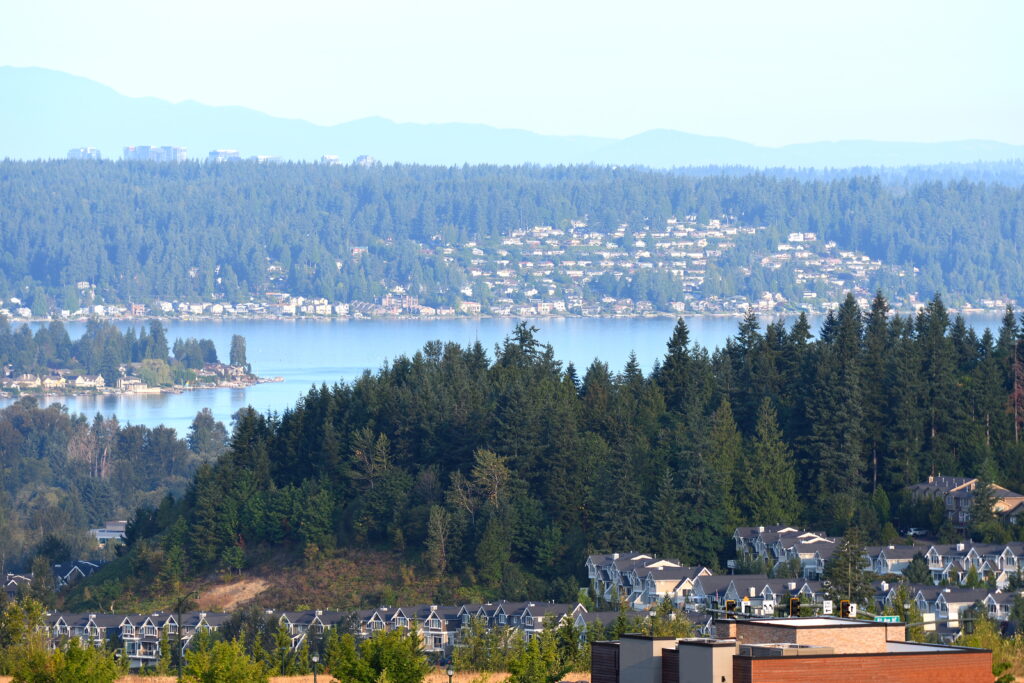
Issaquah
Overview & Location
Issaquah offers a quintessential Pacific Northwest lifestyle surrounded by breathtaking natural beauty, vibrant arts, recreation centers, and all the action of a big city suburb.
Located just 20 minutes from Seattle and 30 minutes from Seattle-Tacoma International Airport, this historic mountain town combines small-town charm with modern amenities, making it a perfect destination for retirees seeking tranquility with easy urban access.
Highlights
- Sustainability: Issaquah is Washington’s first LEED Gold-certified city, with thoughtfully developed urban villages that emphasize green living.
- Outdoor Recreation: Year-round outdoor activities including hiking, biking, kayaking, paragliding, and winter sports. Lake Sammamish State Park offers accessible amenities and water recreation.
- Arts & Culture: Issaquah’s historic downtown is a state designated Creative District, recognized for the density of arts and cultural offerings within a walkable distance.
Potential Drawbacks
- The cost of living is significantly higher than the national average and among the most expensive cities in the state, with median home prices exceeding $900,000.
- Traffic in Issaquah can be heavy, especially near downtown or for those commuting west to Seattle
Financial Planning Considerations
Issaquah’s higher housing costs require careful financial planning. The city’s abundant amenities and proximity to Seattle, however, provide excellent long-term value.
Retiring comfortably in Issaquah may require significant assets or income but Washington’s property tax exemptions for income-qualifying retirees can help offset some costs. Access to world-class medical centers and a well-developed infrastructure make Issaquah an attractive option for retirees with a healthy budget.
Much of the information on Issaquah was provided by Christy Garrard, Executive Director of Visit Issaquah.
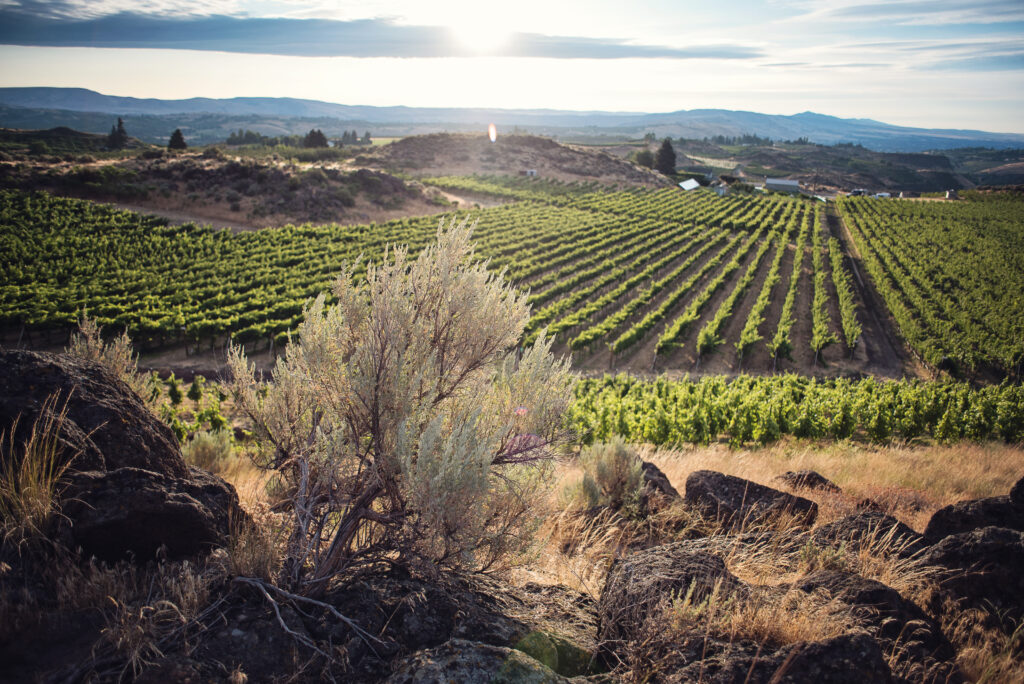
Yakima
Overview & Location
Nestled in central Washington, Yakima is a sunny haven known for its agriculture, wineries, and laid-back pace of life.
Surrounded by rolling hills and scenic vineyards, this affordable city offers retirees a chance to enjoy award-winning wine, fresh local produce, and a vibrant community.
With its lower cost of living and abundant recreational opportunities, Yakima is an attractive destination for retirees seeking a warm and welcoming place to call home.
Highlights
- Affordable Living: Lower housing and living costs make Yakima an attractive option for retirees.
- Wine & Agriculture: Enjoy award-winning wineries, fresh produce, and scenic drives. The region claims to have “pretty much invented farm-to-table” with the largest variety of fresh grown produce in the Pacific Northwest.
- Outdoor Recreation: Yakima River Canyon offers fishing, hiking, and breathtaking views. And that’s just the tip of the iceberg when it comes to outdoor activities in Yakima.
Potential Drawbacks
- Hot summers and wildfire risks.
- Yakima lacks some of the amenities of a bigger city.
Financial Planning Considerations
Yakima’s affordability is one of its strongest financial planning benefits, with property taxes and daily expenses significantly lower than in western Washington. Housing prices in Yakima are among the least expensive in the state, allowing retirees to stretch their hard-earned assets further.
The city’s sunny climate and agricultural economy contribute to a cost-effective lifestyle. In Yakima, retirees have access to affordable fresh produce and numerous recreational opportunities.
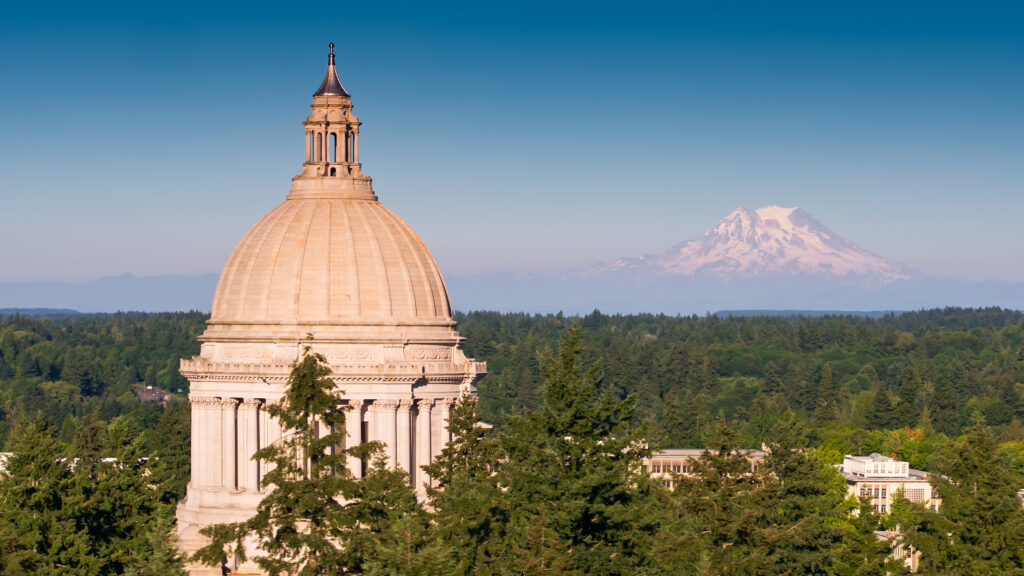
Olympia
Overview & Location
As Washington’s capital, Olympia is a vibrant hub offering retirees a blend of urban sophistication and natural beauty.
Located at the southern tip of Puget Sound, Olympia boasts a walkable downtown filled with coffee shops, restaurants, and cultural venues.
With its wealth of parks, conservation areas, and proximity to Tacoma and Seattle, Olympia provides retirees with a well-rounded lifestyle that balances outdoor recreation and cultural enrichment.
Highlights
- Walkable Downtown: Explore coffee shops, restaurants, and cultural venues in a vibrant city center.
- Natural Beauty: Numerous parks and trails make outdoor exploration easy, and the Puget Sound cuts right through the heart of the city.
- Historical and Cultural Significance: History buffs can walk the beautiful Capitol Campus and visit a number of monuments, memorials, and sculptures throughout the city.
- Proximity to Big Cities: Washington’s capital city is just a 30 minute drive from Tacoma, an hour from Seattle, and two hours north of Portland.
Potential Drawbacks
- Frequent gray skies and rainy weather may not appeal to everyone.
- Residents express concerns about rising crime and homelessness, particularly in the downtown area.
Financial Planning Considerations
Olympia offers many of the benefits of living in the Puget Sound region at a fraction of the price compared to places like Seattle, Bellevue, and Issaquah, albeit a bit further south. The city boasts a mix of affordable housing options and access to top-notch medical centers.
Its vibrant community programs, recreation centers, and free/low-cost cultural events allow retirees to maintain an active lifestyle without overspending. Olympia’s walkability appeals to retirees, but the city has struggled to meet growing demand for senior living communities. This has led to high costs and limited availability of premium facilities.
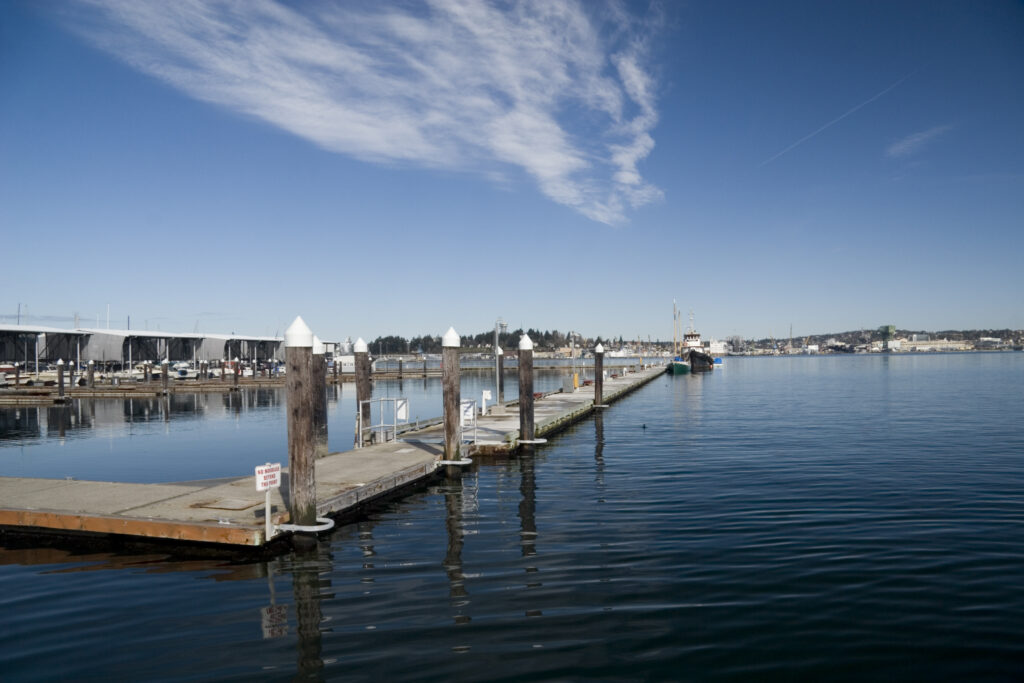
Port Orchard
Overview & Location
Perched on the Kitsap Peninsula, Port Orchard is a charming waterfront town perfect for retiring in Washington state. It offers scenic views, a relaxed pace of life, and strong community ties. With its marinas, local markets, and small-town atmosphere, this coastal gem is perfect for those looking to enjoy a tranquil retirement.
Affordable housing and proximity to Tacoma and Seattle make Port Orchard a practical yet idyllic choice for retirees seeking the best of both worlds.
Highlights
- Waterfront Charm: Enjoy marinas, scenic views of the Olympic Mountains, and relaxing coastal living. Manchester State Park is a popular spot for camping, fishing, hiking, and boating.
- Community Events: Farmers’ markets, local festivals, and neighborhood gatherings foster a strong sense of belonging.
- Affordability: Housing prices and property taxes are more moderate compared to nearby urban centers.
Potential Drawbacks
- Because of its location on the west side of the Puget Sound, leaving Port Orchard often requires a ferry ride (or a long drive!)
- Smaller-scale healthcare facilities compared to larger cities.
Financial Planning Considerations
Port Orchard is a financially savvy choice for retirees seeking affordable housing near the water and a lower cost of living compared to nearby urban centers. Property taxes in Kitsap County are also significantly lower than the state average.
Transportation costs in Port Orchard and the rest of Kitsap County are notably higher than most other places in the state, due in part to the necessity of ferries.
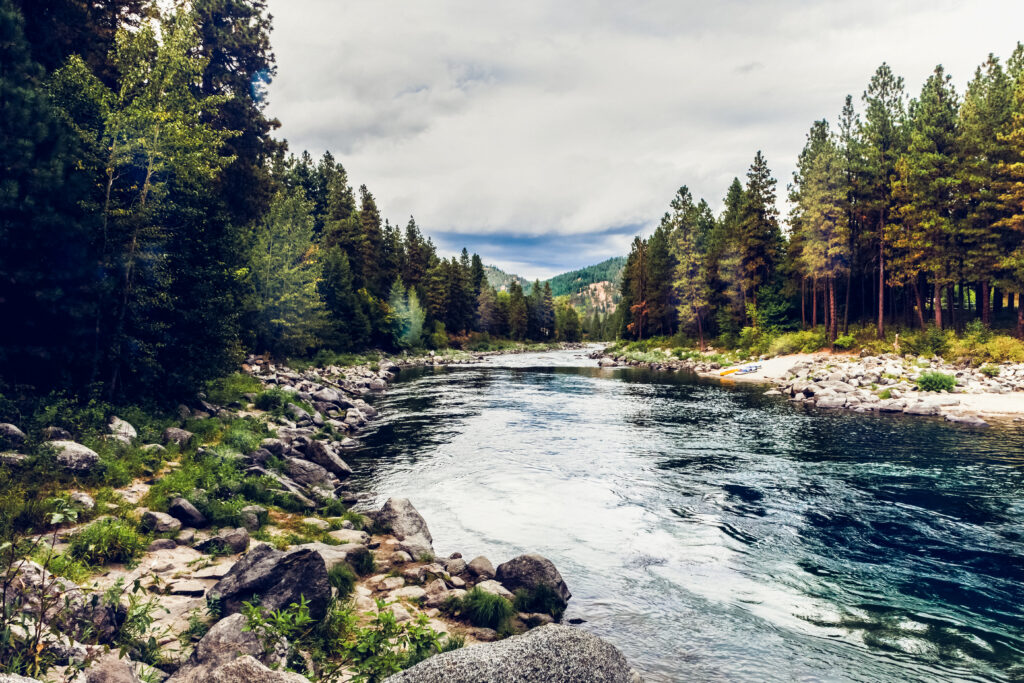
Wenatchee
Overview & Location
Nicknamed “The Heart of Washington” due to its location nestled in the center of the state, Wenatchee is the Apple Capital of the World thanks to its plentiful sunshine in summer months, fertile soil, and abundance of nearby water.
Surrounded by mountains and the Columbia River, this vibrant city is a gateway to the state’s central region. It offers sunny weather and outdoor recreation.
Highlights
- Affordable Living: Lower housing costs compared to western Washington.
- Outdoor Activities: Hike, boat, or fish along the Columbia River or explore the nearby Apple Capital Loop Trail.
- Day Trips: Close to Lake Chelan, Leavenworth, and The Gorge Amphitheatre, the most stunning outdoor venue in the state.
Potential Drawbacks
- Winters can be snowy, which may not appeal to everyone.
- Smaller population and remote location means fewer big-city amenities.
Financial Planning Considerations
Wenatchee’s low cost of living and affordable housing make it a standout choice for retirement living. Its agricultural roots offer a cost-effective lifestyle with easy access to fresh, local produce.
Chelan County has one of the lowest property tax rates in the state of Washington. Plus, property tax exemptions for income-qualifying seniors enhance its appeal for retirees.
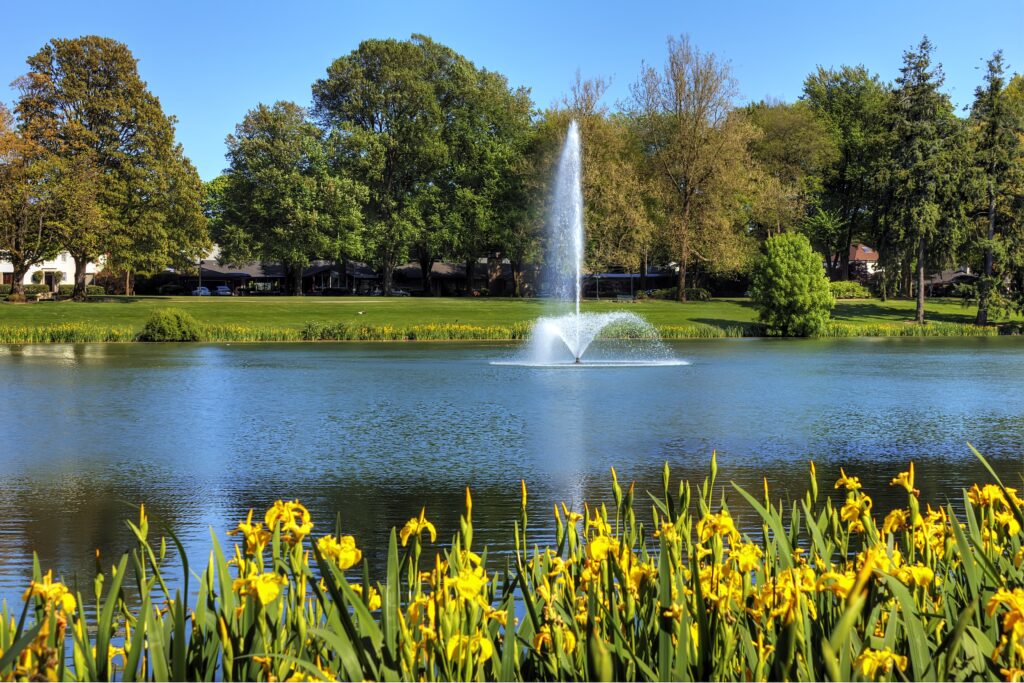
Longview
Overview & Location
Located in southwest Washington at the confluence of the Cowlitz and Columbia Rivers, Longview offers retirees a serene lifestyle surrounded by natural beauty. This historic town boasts a relaxed pace of life, affordable housing, and access to outdoor activities like hiking and fishing.
With its small-town charm and community-focused events, Longview is a great choice for retirees looking to enjoy a slower, more affordable lifestyle in a scenic setting.
Highlights
- Relaxed Lifestyle: A slower pace of life with a strong sense of community.
- Outdoor Attractions: Scenic drives, local parks, and easy access to the Columbia River.
- Affordability: Housing costs are lower than many other Washington cities.
Potential Drawbacks
- Fewer healthcare options and medical centers compared to larger cities.
- Rainier climate typical of southwestern Washington.
Financial Planning Considerations
Longview offers retirees an affordable cost of living with housing prices significantly below the state average.
Its location near the Columbia River provides ample opportunities for low-cost outdoor recreation, while the relaxed pace of life keeps daily expenses manageable for those on a fixed income.
Port Townsend
Overview & Location
Nestled on the northeastern tip of the Olympic Peninsula, Port Townsend is a Victorian seaport steeped in history and artistic charm. Known for its maritime heritage, historic architecture, and stunning waterfront views, this small town offers retirees a unique and culturally rich lifestyle.
With a mild climate and access to outdoor activities, including a state park, Port Townsend provides a perfect blend of relaxation and engagement for retirees seeking a creative and active retirement.
Highlights
- Artistic Vibe: Festivals, galleries, and cultural events highlight the town’s creativity.
- Outdoor Recreation: Beaches, trails, and Fort Worden State Park offer endless adventures.
- Mild Climate: Thanks to the Olympic rain shadow, Port Townsend enjoys fewer rainy days.
Potential Drawbacks
- Limited access to major medical centers.
- Higher housing costs for waterfront properties.
Financial Planning Considerations
While Port Townsend’s housing costs are higher than the national average and the state average, its financial planning benefits stem from affordable cultural and recreational activities.
Retirees can enjoy a high quality of life with minimal daily recreation expenses. This is thanks to the abundance of local events, farmers’ markets, and free outdoor adventures along the beaches and Fort Worden State Park.

Sequim
Overview & Location
Sequim is a charming destination to retire in Washington. It’s located on the Olympic Peninsula and known for its mild climate, breathtaking natural surroundings, and welcoming community.
This idyllic small town combines sunny weather (it is known as “Sunny Sequim”) and a relaxed pace of life with an abundance of outdoor activities, and cultural attractions.
Highlights
- Mild Weather: Benefit from more sunshine than most of the Pacific Northwest.
- Outdoor Recreation: Explore Olympic National Park and coastal beaches or visit the stunning farms that earn Sequim the title of Lavender Capital of North America.
- Community Atmosphere: Monthly art walks, gardening clubs, and welcoming locals create a close-knit environment.
Potential Drawbacks
- Small-town pace may not suit everyone.
- Increased tourist activity during lavender season.
Financial Planning Considerations
Sequim’s lower cost of living relative to other areas in western Washington makes it highly appealing to retirees. Sequim offers a sought-after retreat for those looking to leave Seattle’s hustle and bustle, while still enjoying the stunning natural beauty of the Puget Sound region.
The mild climate helps reduce utility costs, and the city’s small-town charm keeps daily expenses low. With many community programs, recreation centers, and events, Sequim offers retirees a cost-effective yet fulfilling lifestyle.
Transportation costs in Sequim are higher than the cities on the east side of the Puget Sound due to its more remote location.
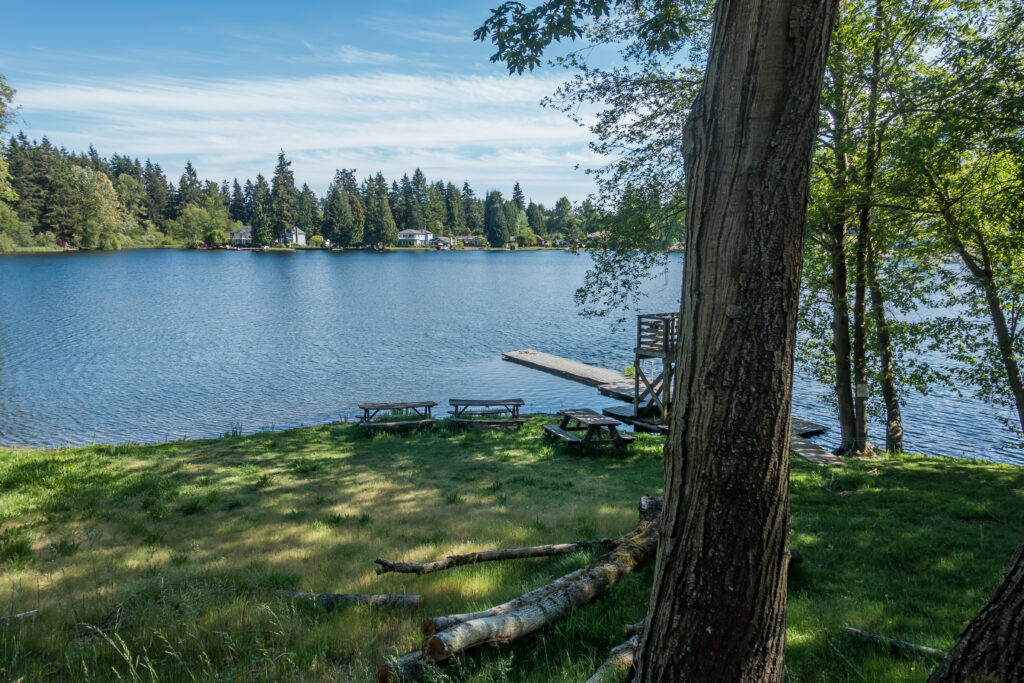
Federal Way
Overview & Location
Ideally located between larger cities Seattle and Tacoma. Federal Way offers retirees suburban convenience with easy access to urban amenities, retirement communities, and medical centers.
Known for its numerous parks, beaches, and cultural attractions, this bustling city is perfect for those who value an active lifestyle close to nature.
Federal Way’s range of retirement communities, senior services, and proximity to major medical centers make it an ideal choice for retirees seeking both comfort and practicality.
Highlights
- Outdoor Activities: Dash Point State Park and the Pacific Bonsai Museum are standout features.
- Convenience: Easy freeway access to Seattle, Tacoma, and nearby medical centers.
- Retirement Communities: A range of senior living options and activities are available.
Potential Drawbacks
- Traffic congestion during peak hours.
- Rainy winters typical of the region.
Financial Planning Considerations
Federal Way balances affordability and accessibility, offering housing costs below the Seattle region’s average. While maintaining proximity to major healthcare and employment centers. Though Federal Way’s cost of living is lower than many Seattle suburbs, it sits in King County, which has some of the higher property tax rates in the state.
The city provides numerous retirement communities while its location allows for cost-effective day trips to nearby cultural and recreational hubs.
Choosing The Best City To Retire In Washington
As financial planners, we know that choosing where to retire is one of the most important decisions you’ll make for your golden years.
To help simplify the process, we created a chart comparing 12 of the best cities in Washington for retirees. This table breaks down factors like affordability, access to quality healthcare, and recreational opportunities so you can focus on what matters most to your lifestyle and financial goals.
Whether you’re looking for a vibrant cultural scene or a peaceful waterfront town, this chart will guide you in making a well-informed decision.
Ready to Start Your Retirement In Washington?
Washington State offers an incredible variety of retirement destinations, from bustling urban hubs to serene small towns.
With no state income tax, abundant recreational opportunities, recreation centers, and diverse climates, the Evergreen State provides the perfect backdrop for your next chapter.
Whether you’re seeking an affordable small-town lifestyle, vibrant cultural attractions, or proximity to outdoor adventures, there’s a city in Washington that fits your retirement dreams.
Ready to take the next step to map out your retirement in Washington state?
You may have questions like…
- Do I have enough to retire comfortably?
- What is the exact date I can stop working?
- How can I proactively lower my tax burden in retirement?
- … and more!
Our team of CERTIFIED FINANCIAL PLANNERS® and fee-only fiduciaries based in Spokane, WA can help. We serve clients virtually across in the US or in-person at our office.
If you’re ready to speak with an experienced team of trusted Spokane Financial Advisors, schedule a complimentary call with our team.
If you would like a preview of how our team helps those in retirement make their money last, check out our YouTube channel on stress-free retirement planning.
Frequently Asked Questions On Retirement In Washington
- How does Washington’s cost of living compare to other states?
Washington’s cost of living is above the national average, particularly in areas like housing and healthcare. However, this is largely attributable to the high prices of the Puget Sound region. The state has many affordable cities to move to. - Does Washington have an estate tax?
Yes, Washington has an estate tax with an exemption threshold of $2.193 million (2025), which means estates above that threshold are subject to a graduated tax rate of 10–20%. Proper planning can help mitigate this. - Will the Washington capital gains tax affect me?
Washington is one of the few states with a state tax on certain long-term capital gains. The exemption threshold as of 2024 is $270,000 in gains and a number of exclusions apply. These exemptions include real estate properties, meaning it will not affect the vast majority of Washington retirees. Similar to the estate tax, proper planning can help minimize the effects of the state capital gains tax. - Is Washington a good state for access to healthcare and long-term care?
Yes! Washington has been named the number 2 state in the nation for long term care and support services. In addition, Washington is a top 10 state for healthcare overall, adding to its appeal as a top retirement destination. - Does Washington state tax retirement income?
No, in fact Washington is one of the few states with no state income tax.
Additional Best Cities To Retire In Washington Resources
Want more resources about retiring in Washington? Check these out:
-
- The 5 Best Spokane Financial Advisors: Are you searching for a Spokane financial advisor to help you develop a retirement strategy, reduce your tax bill, and achieve your financial goals?
- Breaking Down the New Washington Cares Fund: Should you pay Washington’s new long-term care tax or find a private insurer? Our managing partner and financial planner Eric Christiansen weighed in on KXLY.
- How Much Should You Save for Retirement?: How much should you save for retirement? Are you on track for retirement? Read about common retirement questions and retirement strategies.



